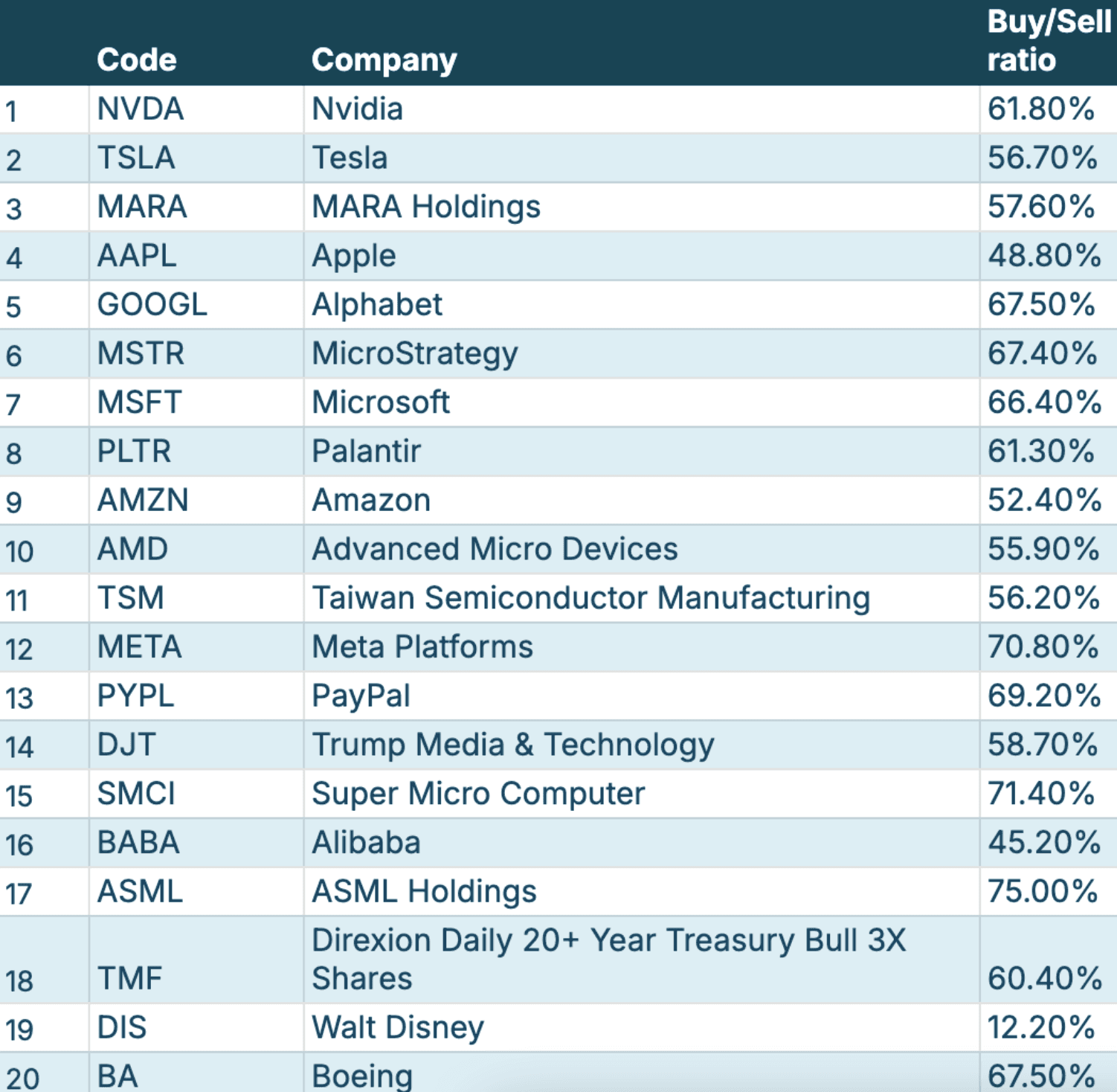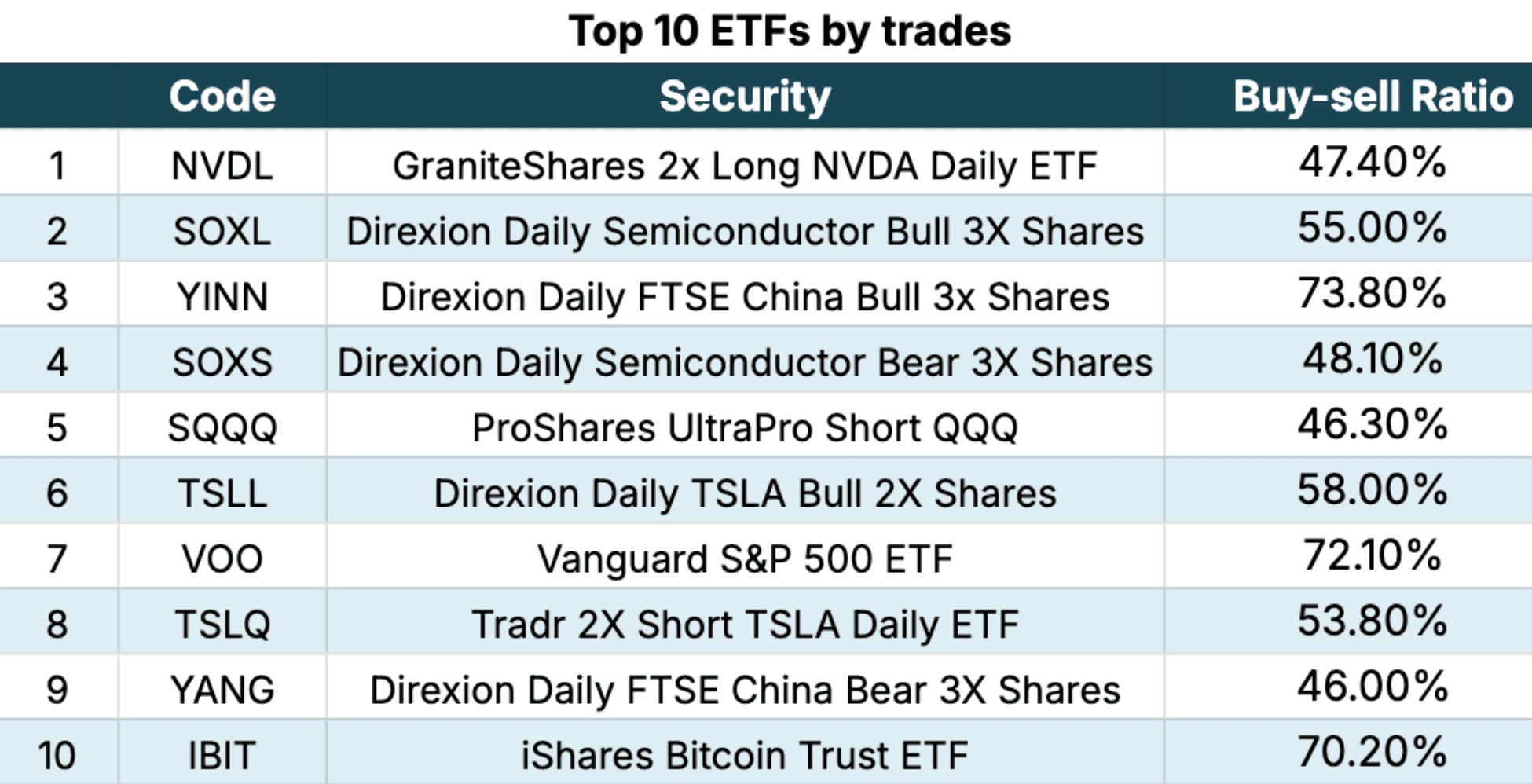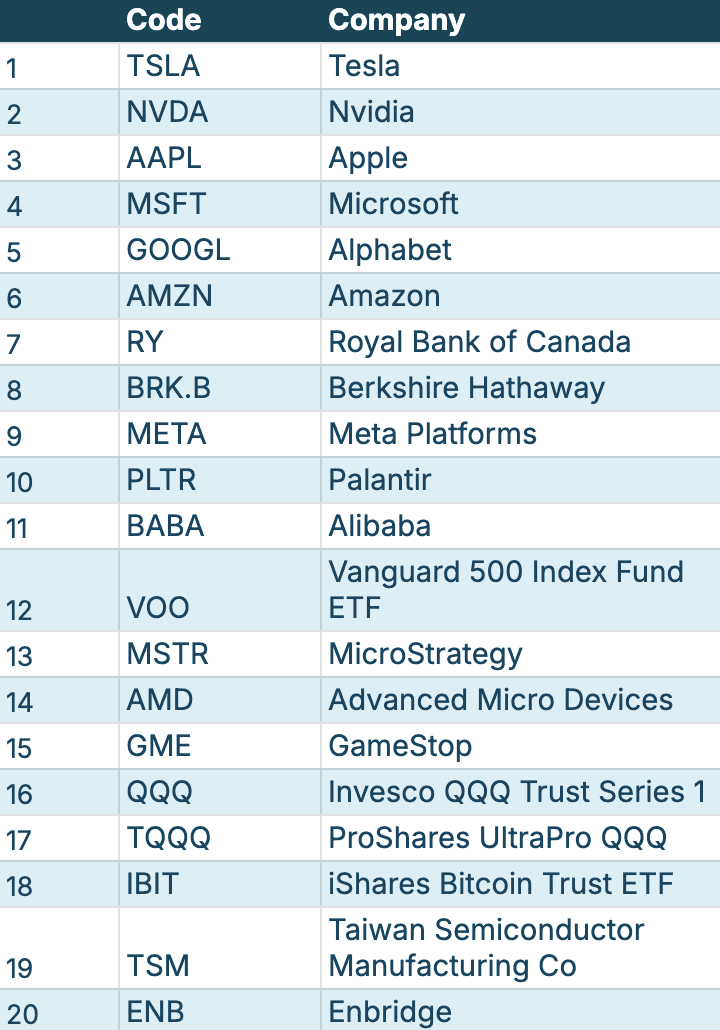Selfwealth most traded US stocks: October 2024
Rene Anthony
Key takeaways:
October brought a surge in trades for semiconductor shares as their fortunes diverged on operational updates.
There were signs of some investors positioning ahead of the US election, namely through exposure to Bitcoin and other risk-oriented assets.
Past performance is not an indicator of future performance you should always undertake your own research.
Investors had plenty of news to monitor last month, from rising bond yields and interest rate speculation to election news, and Wall Street earnings.
Ultimately, the market ended the month with modest losses. The Nasdaq Composite declined 0.5%, the S&P 500 fell 1.0%, while the Dow Jones slipped 1.3%.
However, amid the uncertain backdrop, Selfwealth investors still found plenty of opportunities, which extended to higher risk assets including securities that offer exposure to China, and the small cap sector. We’re covering the most popular trades from last month.
US share trading activity
Semiconductor shares were a popular trade through October, largely on the back of announcements made by the various major players.
Nvidia (NASDAQ: NVDA) was the most traded US share on the platform last month. The chip giant was influenced by the earnings report of its key manufacturing partner, Taiwan Semiconductor Manufacturing (NYSE: TSM) — the 11th most traded share for the month — which offered a bullish outlook to investors. Trade volumes in TSM doubled compared with September, while sentiment remained favourable, even as both stocks achieved record highs.
On the other hand, there was much less fanfare from the market towards shares such as Advanced Micro Devices (NASDAQ: AMD), Super Micro Computer (NASDAQ: SMCI), and ASML Holdings (NASDAQ: ASML). Interestingly, despite each stock’s share price declining sharply through the month, the Selfwealth community held a favourable view towards each company. The trio ranked 10th, 15th, and 17th for monthly trade volumes on the platform respectively.
Weakness across this cohort of chip shares was due to company-specific factors. In the case of AMD, it announced forward guidance for margins that disappointed shareholders. SMCI filed a notice regarding the resignation of its financial auditor, who said they were unable to "rely on management's and the audit committee's representations". And finally, ASML unveiled a downgrade to its 2025 sales outlook.
Meanwhile, EV manufacturer Tesla (NASDAQ: TSLA), in second place, recorded a 123% increase in trade volumes over the month. What’s more, buying conviction rose 10.1 percentage points. Selfwealth investors may have taken confidence from Tesla’s earnings release. The release included a forecast from Elon Musk pointing to 20-30% sales growth in 2025. In response to the news, Tesla delivered its largest share price rally since March 2013, adding around US$150 billion to its market cap in a single session.
Trump Media & Technology (NASDAQ: DJT) made its third appearance among the top 20 trades. However, unlike prior instances, trading activity in DJT last month stemmed from a huge rally in the stock. Across the course of the month, DJT gained 120%, but at one stage was almost as much as 250% higher.

There were only a couple of changes to the list of the most traded US funds last month. However, the two new inclusions on the list related to Chinese equities, with a small cohort of investors actively trading in the likes of Direxion Daily FTSE China Bull 3x Shares (NYSE: YINN) and Direxion Daily FTSE China Bear 3X Shares (NYSE: YANG).
Buying conviction favoured the former, suggesting a more bullish view on Chinese equities — the two funds track leveraged exposure to the FTSE China A50 Index. As to why these two funds found themselves gaining sudden popularity, it may have had something to do with long-awaited details from the Chinese government regarding efforts to stimulate the world’s second largest economy. Such speculation had already seen Chinese shares deliver significant gains over the final days of September.

For only the third time ever on the Selfwealth platform, the ProShares UltraPro Russell2000 (NYSE: URTY) and the ProShares UltraPro Short Russell2000 (NYSE: SRTY) featured among the most traded securities by money flow.
Again, the likely reasoning for their appearance may have related to the election nearing, and investors taking up positions. The so-called ‘Trump trade’ centred on more risky assets, including small cap shares — the focal point of the Russell 2000 Index.
On that point, MARA Holdings, which we touched on earlier, also finished the month as the second most traded US stock by value. In total, around $40 million worth of shares were traded in the company, which is a cryptocurrency miner. That level of money flow represented an increase of nearly 1,300% over the month.
Elsewhere, some less familiar names included Rocket Lab USA (NASDAQ: RKLB), ranked 12th by money flow, Keurig Dr Pepper (NASDAQ: KDP), in 15th, and Li Auto (NASDAQ: LI), a spot behind in 16th position.
The three shares saw contrasting circumstances in October, with RK LB rallying through the month, KDP tumbling late in the month, and Li Auto closing flat after notable volatility.
In the case of Rocket Lab, the company announced a new rocket launch through the month, while likely also benefiting from publicity associated with SpaceX catching a rocket at its launch tower.
Meanwhile, Keurig Dr Pepper reported revenue that fell short of market estimates and an acquisition in the energy drink industry, while Li Auto’s volatility may have had something to do with the reaction to the Chinese government’s stimulus package, which also coincided with the Chinese equity market rally petering out.
Which US shares are the most held?
While there were no changes to the top 10 most popular holdings on the platform, both Alphabet (NASDAQ: GOOGL) and Amazon (NASDAQ: AMZN) recorded a strong uptick in community holdings. While the pair saw their share prices rise 3.2% and 6.2%, Selfwealth holdings increased by 9.1% and 10% respectively, suggesting underlying investor support for the duo.
Last month, both companies reported earnings. Alphabet announced strong revenue growth from its cloud division — sales leapt almost 35% versus a year ago to US$11.35 billion, fuelled by AI-powered enterprise subscriptions. It was a similar story for Amazon, where its cloud revenue accelerated from growth of 12% a year ago to 19% in the most recent quarter. With this, one might assume that investors were attracted to the two companies' exposure to artificial intelligence.
Further down the list, MicroStrategy gained two places, finishing the month as the 11th most held US stock by value. The stock, which effectively offers leveraged exposure to Bitcoin, benefitted last month as the cryptocurrency hit an all-time high. The total value of MSTR holdings on the Selfwealth platform rose 58.2% in October, which includes a 45% rise in share price, alongside strong net buying support.
On the other hand, one of just three shares in the top 20 that saw a net outflow in holdings through the month, Alibaba (NYSE: BABA) slipped two places to 13th. Like other shares directly exposed to China, the stock went backwards as investors digested the Chinese government’s stimulus package. BABA shares fell 7.7% in October, but overall platform holdings declined nearly 12% in value, mirroring the weakness seen in the stock’s trade volume conviction (45.2% buy-to-sell ratio).
Finally, Palantir (NYSE: PLTR) recorded yet another instance of double-digit growth in holdings, marking four consecutive months. PLTR shares gained 11% last month, but with nearly two-thirds of all trades being ‘buys’, and trade values also favouring buying activity, collective holdings on the Selfwealth platform grew by 23.1%.

That’s all for this Trade Trends report, stay tuned for the next edition this time next month.
Important disclaimer: SelfWealth Ltd ABN 52 154 324 428 (“Selfwealth”) (AFSL 421789). The information contained on this website is general in nature and does not take into account your personal situation. You should consider whether the information is appropriate to your needs, and where appropriate, seek professional advice from a financial adviser and/or accountant. Taxation, legal and other matters referred to on this website are of a general nature only and should not be relied upon in place of appropriate professional advice. You should obtain the relevant Product Disclosure Statement for any product mentioned and consider its contents before making any decision.





